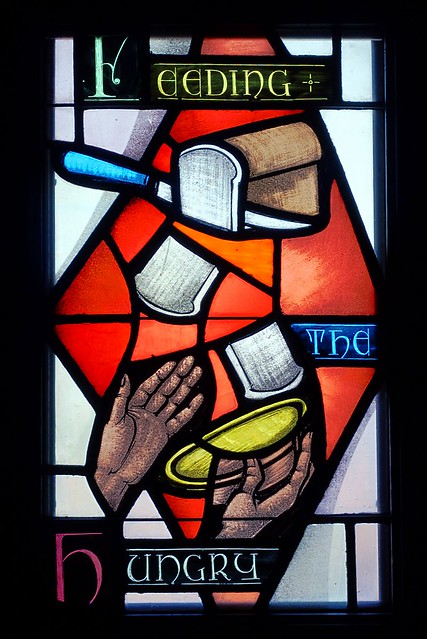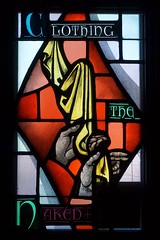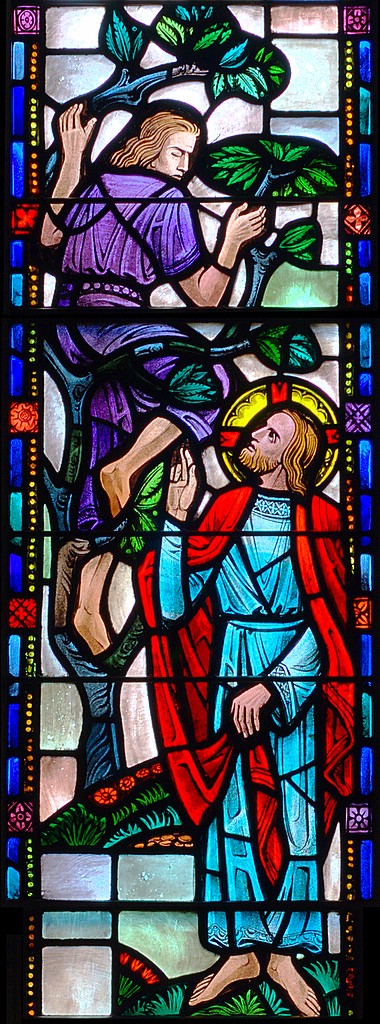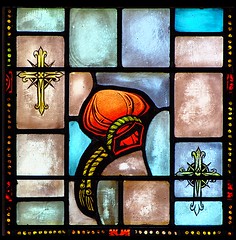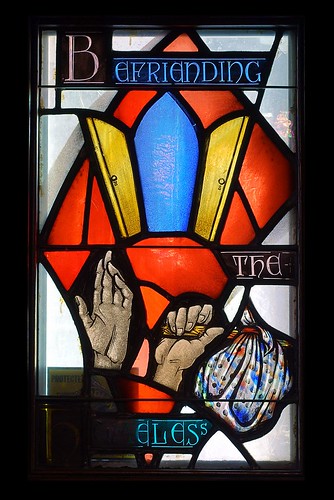(Part 1 of a series of 9 articles on the Beatitudes)
by Pastor Paul Wolff
“Seeing the crowds, (Jesus) went up on the mountain, and when he sat down, his disciples came to him. And he opened his mouth and taught them, saying: ‘Blessed are the poor in spirit, for theirs is the kingdom of heaven.’” (Matthew 5:1-3)
 |
| Blessed are the poor in Spirit (Matthew 5:3) Image from a Mosaic in the Saint Louis Cathedral, St. Louis, Missouri |
The first beatitude is: “Blessed are the poor in spirit, for theirs is the kingdom of heaven.” (Matthew 5:3) No one wants to be poor, but this isn’t talking about worldly wealth and riches. Jesus says, “Blessed are the poor in spirit.” These are Spiritual blessings, and those who are blessed here are people who recognize that they are poor in the Spiritual realm. They have nothing to give God Spiritually, because they are sinners who deserve only God’s wrath and punishment. This is true for all of us, but not all people recognize their Spiritual poverty. The people who are blessed by this Beatitude would certainly receive God’s condemnation unless another arrangement were made. Fortunately for us, Jesus has made another arrangement so that instead of punishment, we receive the blessings of God’s kingdom. Another way to say this is that these are repentant sinners who recognize their poverty of Spirit and know that they must rely on God to rescue them through Jesus Christ.
 |
| Jesus once taught people from a boat on the lake. (see Matthew 13, Mark 4, and Luke 5) |
James 2:5 says, “Listen, my beloved brothers, has not God chosen those who are poor in the world to be rich in faith and heirs of the kingdom, which he has promised to those who love him?” Christians are “rich in faith” because Christ has promised us the inheritance of God’s Kingdom. Though this is not a worldly gift, we trust that this heavenly gift is ours because God has promised to give us this inheritance through faith in Jesus. Jesus said, “Fear not, little flock, for it is your Father’s good pleasure to give you the kingdom.” (Luke 12:32) We may not be rich in this world, but God still provides us all with good things, and He has promised to share with us all the riches of His Kingdom, which is eternal. So we live by faith, and trust that God’s promises are more sure than anything that we may hold in our hands. God’s heavenly Kingdom is already ours by faith, but we must wait to see its fulfillment.
A good example in Holy Scripture of someone who is “poor in spirit” is the character of the tax collector in Christ’s Parable of the Pharisee and the Tax Collector (See Luke 18:9-14). The tax collector was in God’s house looking for God’s blessings, but he was so ashamed of his sin that he wouldn’t even raise up his head, and he simply prayed, “God be merciful to me, a sinner.” Jesus said he was the one who went home justified (forgiven), because he repentantly recognized his poverty of Spirit, and looked to God to save Him.
The opposite of “Poor in Spirit” would be something like “proud in spirit” or “self-righteous.” A good example of this is the Pharisee in Christ’s parable. He was boastful before God because he thought that he was so good that he had something to offer God. He was wrong, of course, but he thought he was so good that God had to be pleased with him. He didn’t recognize the guilt of his sin and how much he deserved God’s condemnation, so he did not repent, nor did he look to God to save him. This is why both John the Baptist and Jesus were so harsh in dealing with unrepentant Pharisees. The Pharisees weren’t bad people in the civil sense, but they were (generally speaking) unrepentant unbelievers. They needed to hear God’s Law to recognize their sin, and the true poverty of their spirit, and their need for God to save them.
Jesus said to the Pharisees, who did not believe in Him, “Therefore I tell you, the kingdom of God will be taken away from you and given to a people producing its fruits.”
(Matthew 21:43) The Pharisees admitted among themselves that they
didn’t believe in Jesus (Matthew 21:25). This is why Jesus told the
Parable of the Wicked Tenants against them. They didn’t want to be God’s
people, and follow Him. They wanted to be in charge themselves. They
were not producing the fruits of faith, because they did not have faith
themselves. The fruits of faith are love, which is the good works done
in obedience to God’s commandments. The Pharisees were too busy trying
to save themselves that they did not do good to others. It is a paradox
that those who are “poor in Spirit” are rich in good works, and those
who think themselves “rich in Spirit” are poor in good works. Hebrews
11:6 tells us, “Without faith it is impossible to please God,
because anyone who comes to him must believe that he exists and that he
rewards those who earnestly seek him.” Repent of your sins and
seek God in the Holy Scriptures because that is where God has revealed
Himself, and there is where God’s Holy Spirit comes to you to bring you
salvation, and God’s Kingdom.
 |
| Jesus was not so proud of Spirit that He wasn’t willing to suffer and die on the cross to save sinners, and give us the blessings of His Kingdom. |
Saint Paul describes Christ’s humility this way in Philippians 2:5-8: “Your attitude should be the same as that of Christ Jesus: Who, being in very nature God, did not consider equality with God something to be grasped, but made himself nothing, taking the very nature of a servant, being made in human likeness … and became obedient to death, even death on a cross.” Jesus was equal to the Father in all things including power, glory, and all His being. However, He humbled Himself as a man to win our forgiveness and salvation. During His life and ministry, Jesus gave up all the honor, glory and riches which rightly belonged to Him as the Son of God, so that He could offer His life as the atoning sacrifice which would provide forgiveness and salvation to all who trust in Him to save them. The result of Christ’s humbling Himself like this is described by Saint Paul in this way: “Therefore God exalted him to the highest place and gave him the name that is above every name, that at the name of Jesus every knee should bow, in heaven and on earth and under the earth, and every tongue confess that Jesus Christ is Lord, to the glory of God the Father.” (Philippians 2:9-11) Jesus did not exalt Himself as a man, but God, the Father, exalted Him (as a man) for His faithful obedience and for winning our salvation.
The blessings that repentant sinners receive is that the Kingdom of heaven is given to them. What this means is that they are welcomed into God’s heavenly kingdom as beloved children who have been washed clean of their sins through the blood of Jesus. The blood of Jesus cleanses us from all our sin (1 John 1:7) because death is the punishment for sin, and Jesus died in our place as our substitute. Through holy Baptism and faith we are adopted back into God’s family as His beloved children, and, having been washed clean of all sin, we will get to enjoy the full blessings of the kingdom of heaven. There we will live in eternal blessedness and peace with God, and all our needs of body and soul will be provided for us by God.
Other articles in this series:
Blessed are Those who Mourn, For They Will be Comforted
Blessed are the Meek, for They Shall Inherit the Earth
Blessed are Those Who Hunger and Thirst for Righteousness, for They Shall be Satisfied
Blessed are the Merciful, for They Shall Receive Mercy
Blessed are the Pure in Heart, for They Shall See God
Coming soon:
Blessed are those who are persecuted for righteousness’ sake, for theirs is the kingdom of heaven.
* Martin Luther quote from Luther’s works, vol. 21: The Sermon on the Mount and the Magnificat (J. J. Pelikan, H. C. Oswald & H. T. Lehmann, Ed.). Luther’s Works (Mt 5:4). Saint Louis: Concordia Publishing House. (©1956)

